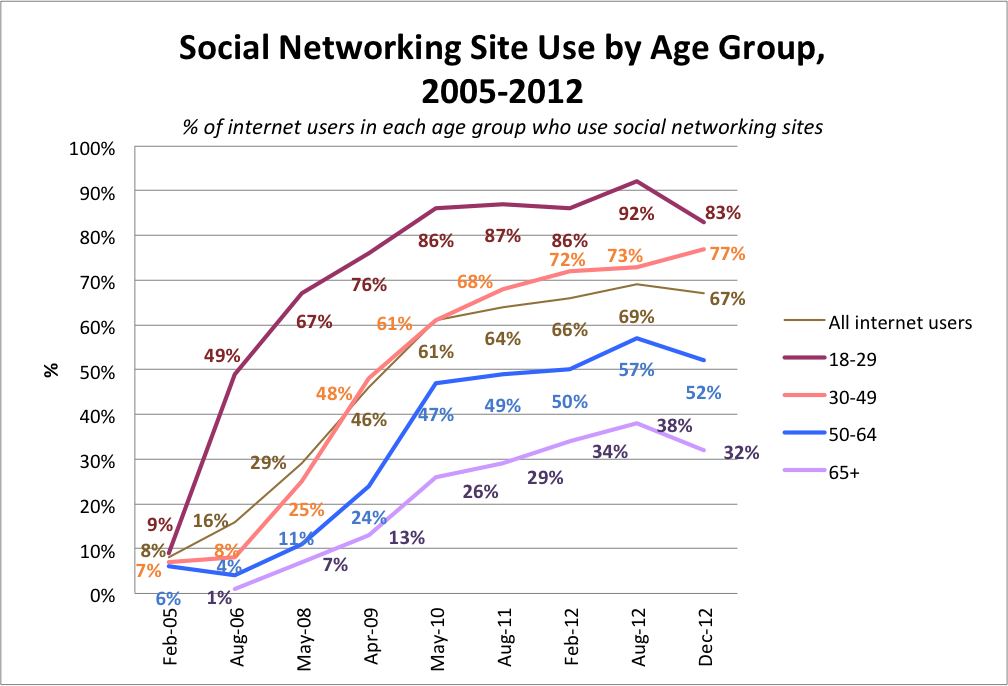
Teens may not have much money, but advertisers still focus on them so as to develop long-term brand loyalty. Get a teen buying Nike at 15, the thinking goes, and she’ll continue to buy Nike throughout her life. Unfortunately, this logic breaks down for social networking sites, which sees a constant churn of flavor-of-the-month social networking apps coming into favor, then falling out of sight.
Don’t believe me? Look at Facebook.
Facebook’s Youth Problem
Facebook used to be the cool spot for teens and twenty-somethings. According to Pew Research Center, it continues to be the most popular social networking site for 18-29 year olds, claiming 86% of that demographic. But as Facebook itself highlights in its annual report, it’s starting to lose its grip on users, generally:
[W]e believe that some of our users have reduced their engagement with Facebook in favor of increased engagement with other products and services such as Instagram. In the event that our users increasingly engage with other products and services, we may experience a decline in user engagement and our business could be harmed.This is particularly true of teens, which have been bolting Facebook for Twitter, Instagram and Snapchat, as Business Insider points out.
Not that any of these services will fare any better than Facebook has.
The Fragmented Teen Social Brain
After all, already apps like Whatsapp and Kik are taking off with teens, just when more established players like Twitter were gaining currency with youth. Their draw? They come closer to emulating the easy communication of SMS than update-centric Facebook or Twitter. Oh, and teens don’t have to interact with their parents on these services.
Don’t bother joining on Kik, Wechat, Whatsapp or whatever other app your teen happens to be into. Give it a few weeks, and something new will come along. Flux is the only constant in social networking tools, it would seem. At least, for teens.
This isn’t a bad thing if you’re a VC, or maybe even if you’re an entrepreneur. After all, when Instagram can go for $1 billion to Facebook, why bother building messy things like long-term revenue streams when you can cash out early?
Building A Social Business
But if you’re trying to build a business than can last more than a few years, this fickleness among the teen set is a big issue. And it’s perhaps doubly hard if you’re an advertiser trying to figure out where to spread your marketing dollars. Despite Facebook’s dominance among the social set, only recently have advertisers warmed up to the platform. If this is true for the market leader, imagine how much harder it is to justify spending advertising dollars with social newbies in a highly fragmented market.
Some, like Kik, aren’t even trying to make money, either because they don’t have to or simply because they don’t know how to do so:
One day, we’ll have to make money. But when we do, we want it to make Kik even more amazing than it already is. Luckily, we have the team, resources, and investors to do that.
Can you say “punt”?
It’s All Joe Kraus’ Fault
In part we can blame all this fragmentation on entrepreneur Joe Kraus, who founded Excite and then JotSpot, which he later sold to Google. Back in 2005 Kraus exulted in a new era for entrepreneurs, one in which new companies could spring up at low cost due to the spread of open source, commodity hardware (now cloud), outsourcing, etc. These same trends have made it easier than ever to spawn a new app, get broad adoption, and become irrelevant. Overnight.
After all, if Instagram could grow from 0 to 40 million users in just 1.5 years, what’s to stop the next social app to sprout up, displacing Instagram et al.?
I suspect we’re going to see a great deal of churn in social networking for a long time to come. One thing we likely won’t see, however, is much of a drop in overall social app adoption, as Pew Research has found:

We’re apparently more social than ever online. It’s just that we trade out apps at a higher velocity than ever, too.
That is, our kids do.
And perhaps that’s what is happening. Maybe most of the experimentation in social apps happens before we hit 18, and then we stick with whatever is the prevalent app among our age group at that time. For me, that’s Facebook (though I’ve essentially dropped it). For you, depending on when your social tastes calcified, perhaps it’s Instagram. Or maybe it’s Chorus.im.
Or if you’re under 18, it’s probably all of the above and many more, some that have yet to be invented.
Image courtesy of Shutterstock
















